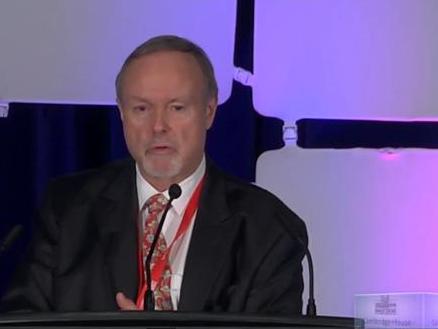Terry Matthews: Canada will become a worldwide data centre hub

Ask a random person in a random country to tell you something about Canada. Okay, Bieber. Okay, Rob Ford. Hockey. Wilderness. And cold.
While the domestic benefits of Bieber are debatable, the benefits of the frigid climes in Edmonton or Sudbury or Thompson will soon be a boon to the Great White North, says one of Canadian tech’s most recognizable proponents.
Sir Terry Matthews was a keynote speaker at the Cantech Investment Conference at the Metro Toronto Convention Centre on January 16th and he touched on what has become a major problem for many large, international businesses in recent years; the growing use of energy to cool the massive data centres that are the mostly unseen black eye of the tech industry.
Reading the New York Times on your iPad may feel greener than leafing through the weighty Sunday Edition, but worldwide, data centres account for approximately 30 gigawatts of energy. That’s a number equal to thirty nuclear power plants, or about 1.5% of our total energy usage. What’s more, Green House Data, a data center services provider that tracks industry energy usage, expects the number will quadruple within a couple years.
Some of the world’s most recognizable technology brands are struggling with their data centre problems on a daily basis. Facebook says that in 2012 at least 34% of the energy used to generate its likes and pokes and inconstant terms of service agreements came from coal. But the world’s largest social media player barely cracks the top five; Oracle, IBM and HP all top 49%, Apple a whopping 55.1%. Is that an iPad Air or the Orient Express?
Matthews says Canada, with its proximity to the United States, which accounts for about a third of worldwide data center energy usage, will become an obvious answer to the data centre problem. He notes that the Chinese have been building data centres in the northern city of Harbin, near the Siberian border, for years.
“Air conditioning for those data centres,” opined the Mitel and Newbridge Networks founder. “Where would the average temperature be lowest? Would Alberta come to mind? Would Northern Ontario come to mind? Watch Canada become, for whatever reason, important to reduce power. Very important for the data centres.”
Matthews notes that green initiatives from federal governments are likely to shape the decisions of global companies in years to come.
“On the one hand they have to reduce the power, on the other hand every single department is asking for more applications. They have no choice but to do a tech refresh. They have no choice but to use cloud infrastructure. They have no choice but to reduce the power that they are using because by law, there will be penalties.”
Below you will find Sir Terry Matthew’s full speech from the Cantech Investment Conference. Skip to the twenty-minute mark for his thoughts on the topic at hand.
_______________________________________________________________________________________________________________
Nick Waddell
Founder of Cantech Letter
Cantech Letter founder and editor Nick Waddell has lived in five Canadian provinces and is proud of his country's often overlooked contributions to the world of science and technology. Waddell takes a regular shift on the Canadian media circuit, making appearances on CTV, CBC and BNN, and contributing to publications such as Canadian Business and Business Insider.
